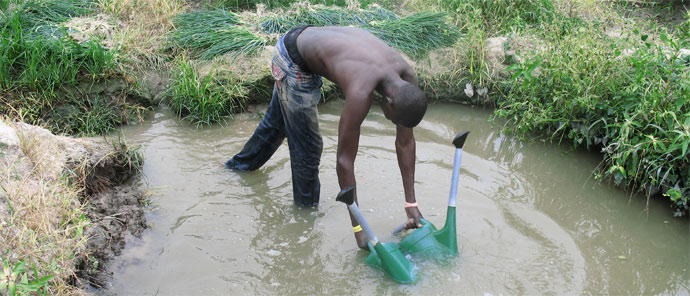In many African countries, access to fresh water resources is restricted and farmers are increasingly dependent on low quality water for irrigation of farm land. The problem is particularly widespread in the increasing peri-urban communities.
Safe Water for Food - SaWaFo
In a new development research project, Safe Water for Food (SaWaFo), DHI takes the lead in investigating the challenges of using low quality water for food production. The low quality water will be examined for chemical content and for bacteria such as E. coli and Campylobacter, as well as parasite eggs and other pathogenic microbial contaminants.
SaWaFo aims at generating improved risk assessment models based on health hazards and exposure scenarios. Moreover, it will describe the regulatory barriers for a sustainable use of low quality water for crop production. The overall objective is to reduce health hazards from using low quality water for farmers and consumers, as well as for farm animals.
In-depth analyses of chemicals
“What sets this project apart from other studies is that we’ll be studying chemicals such as toxic substances, antibiotics and medicinal residues. This has not previously been done in-depth”, explains DHI’s senior advisor Torben Wilde Schou. “We already know quite a lot about pathogenic microorganisms and the risk they constitute in low quality water. Nevertheless, we hope to gain even better knowledge about these microorganisms from the SaWaFo project”, continues Torben. “Finally, we will also be investigating if some types of low quality water are better or worse than others and if traces of contamination end up in the produce”.
Project partners
DHI is the project manager of SaWaFo which has received funding from Danida (Ministry of Foreign Affairs of Denmark) for a 5-year-period, totalling more than EUR 1.2 million . The project is carried out in Ghana and Tanzania, respectively. DHI’s African partners are Sokoine University of Agriculture in Tanzania and Kwame Nkrumah University of Science and Technology in Ghana; the Danish partners are the faculties of Life Sciences, Pharmaceutical Sciences and Health Sciences at the University of Copenhagen. In addition, international organisations such as WHO, FAO and IWMI will also participate in the project.
 Irrigation in urban areas is often carried out with water collected from dug out ponds. The water comes from seeping groundwater or from streams and creeks which may be contaminated by wastewater or nearby industries.
Irrigation in urban areas is often carried out with water collected from dug out ponds. The water comes from seeping groundwater or from streams and creeks which may be contaminated by wastewater or nearby industries.